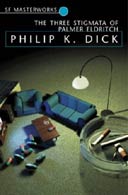 Found this one in a box on the street. I've read Do Androids Dream of Electric Sheep? and Ubik, but years ago, so I was curious about getting a better sense of Dick's writing.
Found this one in a box on the street. I've read Do Androids Dream of Electric Sheep? and Ubik, but years ago, so I was curious about getting a better sense of Dick's writing. My first reaction after finishing it was further annoyance at these snobby pseudo-intellectuals (like Margaret Atwood) who make this forced distinction between Science Fiction and Speculative Fiction, the former being considered adolescent and the latter somehow literature, because they supposedly deal with complex human themes that the former doesn't touch. All of the science fiction books that I have read this year have been very philosophical, with explorations of god, man's perception of himself and the meaning of existence.
The Three Stigmata of Palmer Eldritch starts out in a future world where the earth is overheated to the point that living things can't go out in the day without dying. The wealthy take evolution therapy and the poor are slowly recruited to be colonists on distant planets. The colony effort is basically to get the people off of earth and is considered a punishment. Physical survival is not an issue, but morale is as most of the colonists just sit around and mope on their bleary, depressing planets. Their only escape is a drug called Can-D that puts them into an alternate fantasy earth reality. However, for the drug to work they need to have precise miniatures of the world they are going to enter. The biggest industry on Earth is the production of these miniatures and the drug.
That's the setting. The plot is quite complex and very open to interpretation. I think it's about an invasion of a single, powerful alien being in the personification of Palmer Eldritch, a space explorer who is trying to set up a new drug called Chew-Z that's supposedly way better than Can-D. The book is about the employees of the Can-D company trying to stop him. But because it's constantly dealing with alternate realities, it's difficult to figure out what's real and what's in the drug world and by the end, the two have blurred together. Plus, many of the colonists equate the use of Can-D with a religious experience, so there are all kinds of discussion of translation and transubstantiation.
It's quickly paced and has some interesting ideas. Dick does have a strong sense of the malleability of our reality and he plays well with that in his writing. He is also able to create a future with some big, crazy ideas and not get caught up in the tone and culture of the time he's writing in. I'll pick up another one of his novels in a bit.




2 comments:
Keep your eye out for A Scanner Darkly. It's one I have wanted to read for a long time, it deals with Dick-ian drug themes and a (likely awful) movie adaptation is coming out this year.
I wonder, is "Can-D" a play on "can do," which is exactly what the colonists seem to lack in their immediate reality. Does Dick play like that? If so, are the colonists aware of such things?
For better reasons than the above drivel, this sounds like a good read. Seeking alternate realities (new planets, drugs) is a long time interest of mine.
Post a Comment